
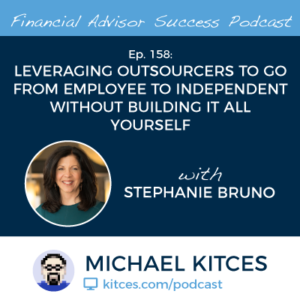 Welcome back to the 158th episode of Financial Advisor Success Podcast!
Welcome back to the 158th episode of Financial Advisor Success Podcast!
My guest on today's podcast is Steph Bruno. Steph is the founder of Sea to Peak Financial Advisors, an independent RIA with offices based in Seattle and Denver that oversees nearly $70 million in assets under management for 45 affluent clients.
What's unique about Steph, though, is that she transitioned to launching her own independent firm only after a 15-year career as an employee in large and mid-sized financial services firms and recognized that she didn't want to manage the infrastructure of actually establishing and running a new firm by herself, so she found an outsourcing partner that from the start would work with her to provide that structure so she could simply focus on what she wanted to focus on, serving the clients she wanted to serve the way she wanted to serve them.
In this episode, we talk in-depth about what led Steph to take the leap and walk away from a stable employee paycheck to build her own firm from scratch. How she initially tucked under another established hybrid advisory firm for support to grow, the realization that owning her own clients meant she'd have to market for her own clients, and now she was going to market herself anyway, she may as well break out entirely on her own, and why Steph decided to hire a personal coach to help her not when many other advisors do, which is once they hit a capacity wall and need to figure out how to best structure the practice going forward, but instead to get coaching support right from the start to help give her the courage and confidence to get through the difficult early years in the first place.
We also talk about Steph's financial planning process with clients and how she starts by creating a money meaning map using mind mapping software to help provide clients a deliverable to demonstrate her value after the very first prospect meeting, the way she integrates life planning conversations into her planning process, the challenge that Steph had in rebooting her marketing after relocating to a new city, and the way she's beginning to further shift her focus towards a niche of working with busy executives to better strengthen and focus her own marketing process, in particular with e-books and networking meetings going forward.
And be certain to listen to the end, where Steph talks about how, if she'd do it all over again, she would have taken the leap even sooner, but how even though it's worked out, the early years are still incredibly difficult. The role that both her coach and advisor-peers' support played in getting her through those challenging years early on, the reasoning she used when she decided to take an early withdrawal from her IRA to invest in herself in launching her new practice a decade ago, and the importance of recognizing the difference between doing work you're good at and being proud of it versus doing the work you really love to do.


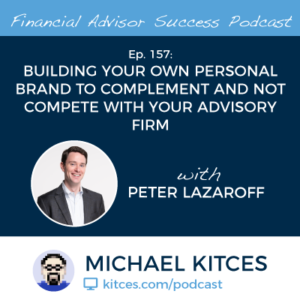 Welcome back to the 157th episode of Financial Advisor Success Podcast!
Welcome back to the 157th episode of Financial Advisor Success Podcast!
 Welcome back to the 156th episode of Financial Advisor Success Podcast!
Welcome back to the 156th episode of Financial Advisor Success Podcast!

 Welcome back to the 154th episode of Financial Advisor Success Podcast!
Welcome back to the 154th episode of Financial Advisor Success Podcast!
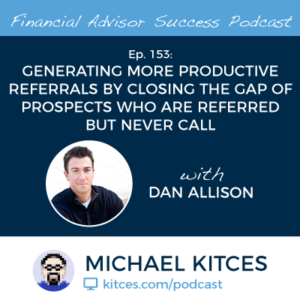 Welcome back to the 153rd episode of Financial Advisor Success Podcast!
Welcome back to the 153rd episode of Financial Advisor Success Podcast!
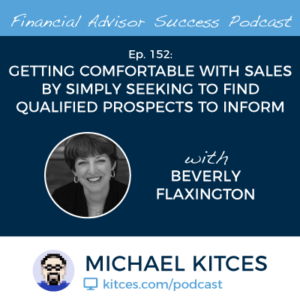 Welcome back to the 152nd episode of Financial Advisor Success Podcast!
Welcome back to the 152nd episode of Financial Advisor Success Podcast!
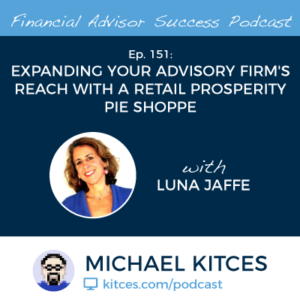 Welcome back to the 151st episode of Financial Advisor Success Podcast!
Welcome back to the 151st episode of Financial Advisor Success Podcast!
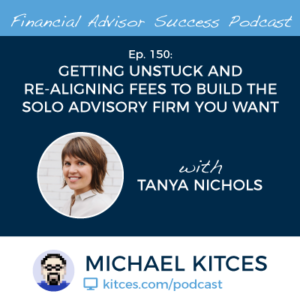 Welcome back to the 150th episode of Financial Advisor Success Podcast!
Welcome back to the 150th episode of Financial Advisor Success Podcast!
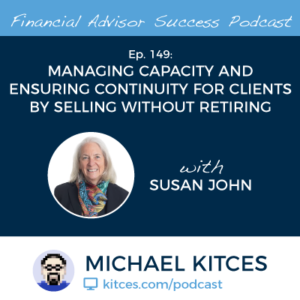 Welcome back to the 149th episode of Financial Advisor Success Podcast!
Welcome back to the 149th episode of Financial Advisor Success Podcast!
